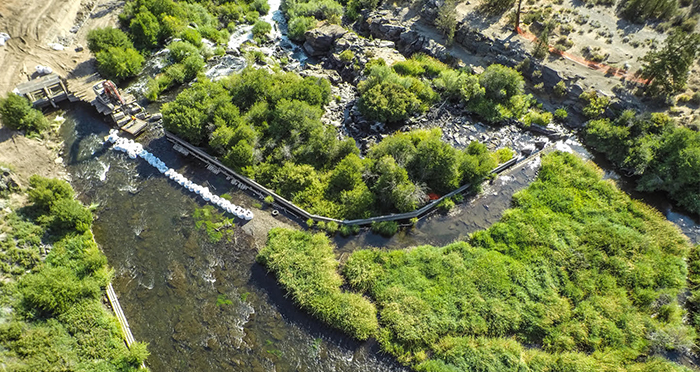Historic clean-up will promote a healthy river ecosystem.
Deconstruction of the more than 100-year-old wood and concrete dam along with hydroelectric equipment at Cline Falls on the Deschutes River near Redmond is underway and is expected to continue through the end of August.
Once completed, resident trout and wildlife will be able to migrate freely through the former dam site, accessing river and riparian habitat along the Upper Deschutes.
Crews have installed a cofferdam, a temporary watertight enclosure that allows the enclosed area to be pumped out. This pumping creates a dry work environment for the dam removal to proceed. Beginning today, an excavator with an air-chisel attachment will be used to demolish sections of the dam.
“As owners of the land we’ve been committed to removing this dam for years in an effort to return the Deschutes River to its natural state,” said Craig Horrell, district manager of the Central Oregon Irrigation District. “To finally see the dam removal and site clean-up in action was a very proud moment for our organization.”
Following a successful settlement with PacificCorp, who previously leased the site from Central Oregon Irrigation District, the Cline Falls dam removal and associated equipment and structures of the former hydroelectric power plant is the joint effort of the Central Oregon Irrigation District in cooperation with the Upper Deschutes Watershed Council.
Removal of the 120-foot-long, 5-feet-tall dam will improve ecological conditions of the river by allowing the river to flow naturally and restore the natural movement of sediment downstream. The project also includes site clean-up of left-behind contaminants.
Project costs are expected to exceed $2 million and are being financed by a settlement with Pacific Power.
Central Oregon Irrigation District
Established in 1918, Central Oregon Irrigation District (“COID”) is a Municipal Corporation of the State of Oregon. The District’s mission is to provide a reliable supply of water to 3,500 patrons throughout Bend, Redmond, Powell Butte and Alfalfa through its system of more than 700 miles of canals. COID delivers water to each patron so all can work, play and thrive, while at the same time ensuring the needs of future patrons can be met through conservation and more efficient delivery methods.
www.coid.org





